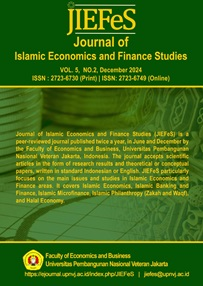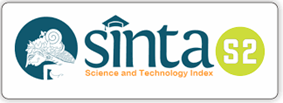Does Macroeconomics and Human Development Index Affect Zakat Performance?
DOI:
https://doi.org/10.47700/jiefes.v5i2.7717Keywords:
Human Development Index, Inflation, Number of Employed People, Zakat PerformanceAbstract
Macro variables and the Human Development Index are among the influential factors affecting the amount ZIS collection in Indonesia. The impact has been that the realization and potential of ZIS collection are not balanced when compared to the number of Muslim populations in Indonesia. This research aims to examine the impact of macroeconomics and human development index on zakat performance in Indonesia. Zakat performance is measured using the natural log of the total receipt of ZIS obtained from 39 zakat management organizations from 2011 to 2022, totaling 206 observations. The independent variables in this study are proxied by macroeconomics (i.e., inflation and number of employed people) and human development index. The data were analyzed using a panel data estimation technique as known pooled least square. The empirical results of this study found that inflation has a negative and insignificant effect on zakat performance. Number of employed people do not affect zakat performance. Meanwhile, human development index has a positive and significant effect on zakat performance. Synergy and coordination among zakat management organizations and the socialization of zakat literacy become essential factors in realizing the potential of zakat that has not been optimally collected. Additionally, the government can create a policy-making zakat mandatory for muslim communities by implementing good governance.
References
Akhter, A., Javed, M. Y., & Akhter, J. (2023). Research trends in the field of Islamic social finance: a bibliometric analysis from 1914 to 2022. International Journal of Ethics and Systems. https://doi.org/10.1108/IJOES-03-2023-0044
Alshater, M. M., Hassan, M. K., Sarea, A., & Samhan, H. M. (2022). Islamic accounting research between 1982 and 2020: a hybrid review. Journal of Islamic Accounting and Business Research. https://doi.org/10.1108/JIABR-04-2021-0132
Alshater, M. M., Saad, R. A. J., Abd. Wahab, N., & Saba, I. (2021). What do we know about zakat literature? A bibliometric review. Journal of Islamic Accounting and Business Research, 12(4), 544–563. https://doi.org/10.1108/JIABR-07-2020-0208
Amalia, E. (2019). Good Governance for Zakat Institutions in Indonesia: A Confirmatory Factor Analysis. Social Sciences & Humanities, 27(3), 1815–1827.
Amri, K. (2020). Pengaruh Zakat dan Kesempatan Kerja terhadap Tingkat Kemiskinan di Aceh. Al-Muzara’Ah, 7(2), 57–70. https://doi.org/10.29244/jam.7.2.57-70
Anwar, & Khalsiah. (2017). An analysis of Service Quality on Mustahiq Satification using the Kano Model (Case Study on Baitul Mal). Emerald Reach Proceedings Series, 1, 63–68. https://doi.org/10.1108/978-1-78756-793-1-00058
Armina, S. H. (2020). Pengaruh Variabel Makroekonomi Terhadap Jumlah Penghimpunan Zakat di Indonesia. Jurnal Ekonomi, 25(2), 199. https://doi.org/10.24912/je.v25i2.652
Armina, S. H., & A’yun, A. ’Aina. (2019). Pengaruh Inflasi, Kurs Dollar, dan BI 7-Day Repo Rate terhadap Penghimpunan Zakat (Periode 2015-2018). Al-Iqtishadiyah: Jurnal Ekonomi Syariah Dan Hukum Ekonomi Syariah, 5(2), 151–163.
Atabik, A. (2015). Manajemen Pengelolaan Zakat yang Efektif di Era Kontemporer. ZISWAF: Jurnal Zakat Dan Wakaf, 2(1), 40–62.
BAZNAS, P. (2022). Outlook Zakat Indonesia 2022. Pusat Kajian Strategis Badan Amil Zakat Nasional (Puskas BAZNAS).
BAZNAS, P. (2023). Outlook Zakat Indonesia 2023. Pusat Kajian Strategis Badan Amil Zakat Nasional (Puskas BAZNAS).
Canggih, C., Fikriyah, K., & Yasin, A. (2017). Potensi Dan Realisasi Dana Zakat Indonesia. Al-Uqud : Journal of Islamic Economics, 1(1), 14. https://doi.org/10.26740/jie.v1n1.p14-26
Chapra, M. U. (1992). Islam and the Economic Challenge. International Institute of Islamic Thought (IIIT).
Diniati, B. T. (2021). Pengaruh BI Rate, Penanaman Modal Dalam Negeri, Produk Domestik Bruto, Jumlah Penduduk, Indeks Produksi Industri Terhadap Penghimpunan Dana Zakat Di Indonesia Tahun 2015.01-2019.12. Juornal of Economics and Policy Studies, 2(1), 44–55. https://doi.org/10.21274/jeps.v2i1.4670
Falikhatun, & Putri, A. (2022). Board of Directors’ Size and Profitability of Sharia Insurance in OIC Countries. Jurnal Akuntansi Dan Bisnis, 22(1), 154–166.
Firmansyah, I., & Devi, A. (2017). The Implementation Strategies of Good Corporate Governance for Zakat Institutions in Indonesia. International Journal of Zakat, 2(2), 85–97.
Ghaouri, M. H., Kassim, S., Othman, A. H., & Zakariyah, H. (2023). Behavioural Intention of Zakat Participants Toward The Zakat Fund in Morocco. ISRA International Journal of Islamic Finance, 15(1), 36–53.
Gujarati, D. N. (2003). Basic econometrics (Fourth Edi). McGraw-HiII/lrwin.
Hamdani, L., Sunarsih, S., Yusfiarto, R., Rizal, A., & Khoirunnisa, A. N. (2024). Social media, trust and intention to pay zakat through institution: lessons from Indonesian experience. Journal of Islamic Marketing. https://doi.org/10.1108/JIMA-01-2023-0016
Hanoatubun, S. (2020). Dampak Pandemi Covid-19 Terhadap Perekonomian Indonesia. Journal of Education, Psychology Dan Counseling, 2(1), 146–153. https://doi.org/10.22216/jbe.v5i2.5313
Hayati, S. R., & Putri, S. A. M. (2020). The Efficiency of Zakat Management Organizations in Indonesia: Data Envelopment Analysis Approach. Muqtasid: Jurnal Ekonomi Dan Perbankan Syariah, 10(2), 95–106. https://doi.org/10.18326/muqtasid.v10i2.95-106
Indrarini, R. (2017). Transparansi Dan Akuntabilitas Laporan Keuangan Lembaga Amil Zakat: Perspektif Muzaki UPZ BNI Syariah. AKRUAL: Jurnal Akuntansi, 8(2), 166–178. https://doi.org/10.26740/jaj.v8n2.p65-77
Iskandar, A., Possumah, B. T., & Aqbar, K. (2020). Peran Ekonomi dan Keuangan Sosial Islam saat Pandemi Covid-19. SALAM: Jurnal Sosial Dan Budaya Syar-I. https://doi.org/10.15408/sjsbs.v7i7.15544
Islamiyati, D., & Hany, I. H. (2021). Pengaruh Inflasi, Indeks Produksi Industri dan Kurs terhadap Penghimpunan Zakat, Infaq dan Sedekah. Telaah Bisnis, 20(2), 25. https://doi.org/10.35917/tb.v20i2.167
Jouti, A. T. (2019). An integrated approach for building sustainable Islamic social finance ecosystems. ISRA International Journal of Islamic Finance, 11(2), 246–266. https://doi.org/10.1108/IJIF-10-2018-0118
Mirza, D. S. (2012). Pengaruh Kemiskinan, Pertumbuhan Ekonomi, dan Belanja Modal Terhadap Indeks Pembangunan Manusia di Jawa Tengah Tahun 2006-2009. Economics Development Analysis Journal, 1(1), 2–15. https://journal.unnes.ac.id/sju/index.php/edaj/article/view/474
Murobbi, M. N., & Usman, H. (2021). Pengaruh Zakat, Infak Sedekah, dan Inflasi Terhadap Kemiskinan di Indonesia. Jesya (Jurnal Ekonomi & Ekonomi Syariah), 4(2), 846–857. https://doi.org/10.36778/jesya.v4i2.390
Pratama, Y. C. (2015). Peran Zakat Dalam Penanggulangan Kemiskinan (Studi Kasus : Program Zakat Produktif Pada Badan Amil Zakat Nasional) [The Role of Zakat in Poverty Alleviation (Case Study: Productive Zakat Program at the National Amil Zakat Board)]. The Journal of Tauhidinomics, 1(1), 93–104.
Pratowo, N. I. (2013). Analisis Faktor-Faktor Yang Berpengaruh Terhadap Indeks Pembangunan Manusia. Studi Ekonomi Indonesia, 15–31.
Putra, T. W., Trimulato, Muhlis, Fajrin, F., & Supriadi. (2020). The Role of Islamic Social Finance in Covid-19. Jurnal Iqtisaduna.
Saad, R. A. J., Idris, K. M., Shaari, H., Sawandi, N., & Derashid, C. (2017). Governance of non-Profit Organizations: A Case of Zakat Institutions in Malaysia. International Journal of Economic Research, 14(16), 253–265.
Sawmar, A. A., & Mohammed, M. O. (2021). Enhancing zakat compliance through good governance: a conceptual framework. ISRA International Journal of Islamic Finance, 13(1), 136–154. https://doi.org/10.1108/ijif-10-2018-0116
Wahyuni-TD, I. S., Haron, H., & Fernando, Y. (2021). The effects of good governance and fraud prevention on performance of the zakat institutions in Indonesia: a Sharīʿah forensic accounting perspective. International Journal of Islamic and Middle Eastern Finance and Management, 14(4), 692–712. https://doi.org/10.1108/IMEFM-03-2019-0089
Widiastuti, T., Cahyono, E. F., Zulaikha, S., Mawardi, I., & Al Mustofa, M. U. (2021). Optimizing zakat governance in East Java using analytical network process (ANP): the role of zakat technology (ZakaTech). Journal of Islamic Accounting and Business Research, 12(3), 301–319. https://doi.org/10.1108/JIABR-09-2020-0307
Yang, D., & Babiak, K. (2023). A study on corporate foundation and philanthropy: Does governance matter for organizational performance ? Nonproft Management and Leadership, 1–22. https://doi.org/10.1002/nml.21555
Yolanda, F., Pramono, S. E., & Zaenal, M. H. (2020). The Effect of Internal Control, Information Technology and Audit on Good Amil Governance Practices: Evidence from BAZNAS Kalimantan, Indonesia. International Journal of Zakat, 5(2), 67–82.
Zakaria Muchtar, F. T., & Widiastuti, T. (2022). Analisis Faktor-Faktor yang Mempengaruhi Penghimpunan Zakat: Studi di Empat Negara ASEAN. Jurnal Ekonomi Syariah Teori Dan Terapan, 9(5), 658–671. https://doi.org/10.20473/vol9iss20225pp658-671
Zakiy, F. S., & Falikhatun, F. (2023). Comparison of Effectiveness and Growth Performance in Zakat Institutions: Insight from Indonesia. Journal of Accounting Research, Organization, and Economics, 6(3), 291–302.
Zakiy, F. S., & Falikhatun, F. (2024a). The role of intellectual capital on zakat performance: insight from Indonesia. Journal of Intellectual Capital, 25(5/6), 1006–1025. https://doi.org/10.1108/JIC-12-2023-0280
Zakiy, F. S., & Falikhatun, F. (2024b). Value for Money Analysis of Zakat Institutions: Insights from Indonesia. ZISWAF: Jurnal Zakat Dan Wakaf, 11(1), 82–98. https://doi.org/10.21043/ziswaf.v11i1.20832
Zakiy, F. S., Falikhatun, F., & Fauziah, N. N. (2023). Sharia governance and organizational performance in zakat management organization: evidence from Indonesia. Journal of Islamic Accounting and Business Research. https://doi.org/10.1108/jiabr-06-2023-0188
Downloads
Published
Issue
Section
License
Copyright (c) 2024 Faris Shalahuddin Zakiy, Anik Gita Yuana, Alifya Nurul Falach, Fitria

This work is licensed under a Creative Commons Attribution 4.0 International License.
Authors who publish with this journal agree to the following terms:
- Authors retain copyright and grant the journal right of first publication with the work simultaneously licensed under a Creative Commons Attribution 4.0 International License that allows others to share the work with an acknowledgment of the work's authorship and initial publication in this journal.
- Authors can enter into separate, additional contractual arrangements for the non-exclusive distribution of the journal's published version of the work (e.g., post it to an institutional repository or publish it in a book), with an acknowledgment of its initial publication in this journal.
- Authors are permitted and encouraged to post their work online (e.g., in institutional repositories or on their website) before and during the submission process, as it can lead to productive exchanges, as well as earlier and greater citation of published work.

This work is licensed under a Creative Commons Attribution 4.0 International License.











